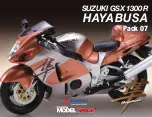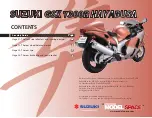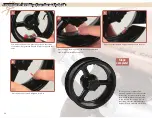
68
SUZUKI
GSX 1300R Hayabusa
: Assembly Guide
STAGE 21
Area you are working on
Detail
The front side
reflectors and
steering damper
Tools
Prepare
Useful to have
Phillips screwdriver (Stage 7)
Cross wrench
Tweezers
Front fork assembly (Stage 9)
Masking tape
Plastic bag
Pen
Multi-purpose adhesive
Your parts
The steering damper is a device for
absorbing vibrations in the steering
that occur during running. The impact
from the road surface is absorbed by
the suspension forks, but without the
steering damper, any impact to the
steering system would be transmitted
directly to the rider. Mounting a
shock absorber on the axis of rotation
of the front forks prevents this. The
steering damper is reproduced on the
model, showing the attention to detail
achieved with your Suzuki Hayabusa.
Prepare the
front fork
assembly from
Stage 9. Use the cross wrench to
loosen and remove the 2.3 × 8mm
hex screws from either side of the
front forks (circled).
1
Adhesive sheet
Steering damper case
Damper shaft
Front left reflector mount
Front right reflector mount
Front reflectors × 2
2 × 11mm lag screws × 2
M2 nuts × 2
2.3 × 6mm screws × 12
Peel away the backing from the adhesive
sheet, leaving the two adhesive discs
intact, as shown in the inset.
2































